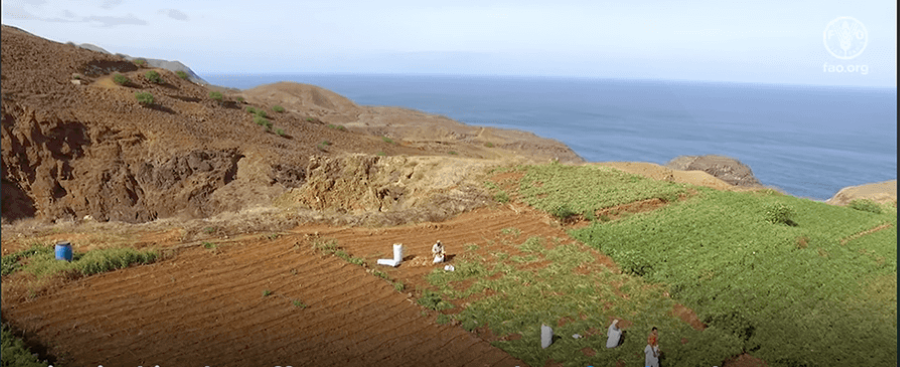(4 Minutes Read)
As a part of the project with China, experts from that country in different areas including pest management, soil and water management, fertilization, and livestock production will work closely with Cabo Verdean farmers over the next three years
Cabo Verde is increasingly bearing the brunt of the effects of climate change. Back in 2018, the archipelago of ten islands lying in West Africa was hit by a severe drought. The country is mostly dependent on agriculture and was worst affected then. Rainfall has been scarce and more unpredictable than in previous years prior, leading to a significant drop in food production and grazing land losses. The COVID-19 pandemic is a nemesis to another source of income; tourism. The country has slipped into a trajectory of food insecurity due to a double whammy of drought and abrupt stoppage of tourist arrivals.
Cabo Verde relies heavily on imports. Over 80 percent of its food is imported. This makes the country’s food security vulnerable to worldwide shocks like conflicts or disasters. Import of food from donor countries and agencies might have improved the food availability, but agriculture continues to suffer because of severe drought and unpredictable rains. Besides, soil erosion has increased, and soil fertility plummeted. Pest attack also is very rampant to add to the woes of the farmers. The telling impact of the proliferation of pests is on the mangoes, which are grown in abundance. The presence of fruit flies wreaked havoc on mango crops. Maize crops also have been severely affected by pests so also tomato harvest, another major crop.
Through FAO, Cabo Verde requested assistance in fighting these growing challenges from China, which has the expertise and experience to address the problem. That led to a trilateral partnership between FAO, China and the host country to address the challenges. It has urged China to transfer technologies that are appropriate to withstand the vagaries of nature since that country had faced such problems earlier in its effort to increase agricultural production.
As a part of the project with China, experts from that country in different areas including pest management, soil and water management, fertilization, and livestock production will work closely with Cabo Verdean farmers over the next three years. The aim, among other things, is to establish a standard for biological pest control, which will be promoted in Cabo Verde. This will greatly improve the efficiency of crop pest control on a large scale, significantly reducing the yield losses caused by pests and ensuring an increase in food and horticultural crop production.
Cabo Verde imports the majority of its food products, including animal fodder. This makes the country very vulnerable to market shocks that affect food and feed prices, thus making increasing domestic fodder production an important task for the project.
The government of Cabo Verde highlighted the management of horticulture and soil fertility, plant protection, and the improvement of animal production and enhancement of animal genetics as some priority areas for South-South Cooperation assistance. Later this year, there will also be a study on the potential of seaweed cultivation and value chain enhancement for this product.
Read Also:
https://trendsnafrica.com/un-secretary-general-in-cabo-verde-to-attend-ocean-race-summit/
https://trendsnafrica.com/cape-verde-a-small-island-country-aims-big-through-tourism/
Innovations, shared expertise and replicable practices are key to facing these challenges. With all countries tackling climate change in different ways, experiences and solutions must be shared among them. Partnerships, like the FAO-Cabo Verde-China one, are helping bring everyday solutions to the country’s farmers and smallholder livestock producers.





